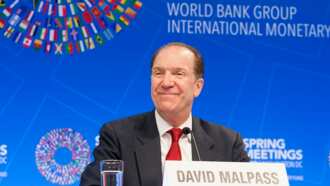The World Bank has announced its approval of Nigeria’s request for a $1.5 billion (approximately N571 billion) loan barely two years it approved $486 million (N185 billion) loan for the West African country to improve electricity transmission network and infrastructure.
The Bretton Wood institution made this known on Tuesday, December 15, saying this will help the country "realise its long-term potentials."
According to the financial institution, the facility is a 5-year country partnership framework (CPF) that would last from 2021 to 2024, Sahara Reporters reporters.
 Speaking on the development, Shubham Chaudhuri, World Bank country director for Nigeria, said the loan will focus on four areas of engagement.. Credit: @DavidMalpassWBG
Speaking on the development, Shubham Chaudhuri, World Bank country director for Nigeria, said the loan will focus on four areas of engagement.. Credit: @DavidMalpassWBG
These include investing in human capital, promoting jobs and economic transformation and diversification, enhancing resilience and strengthening the foundations of the public sector.
Chaudhuri said the approval of the loan, which was requested in the wake of the devastating impact of the coronavirus pandemic, was delayed to allow Nigeria to carry out currency reform including the unification and flexibility of the exchange rate, removal of fuel subsidy, among others.
He stated:
“This country partnership framework will guide our engagement for the next five years in supporting the government of Nigeria’s strategic priorities by taking a phased and adaptive approach.
“To realize its long-term potential, the country has to make tangible progress on key challenges and pursue some bold reforms. Our engagement will focus on supporting Nigeria’s efforts to reduce poverty and promote sustained private sector-led growth.”
Meanwhile, the Nigerian Bureau of Statistics (NBS) has stated that about 68% of households in Nigeria wallowing in poverty have resulted in taking loans just to buy foods.
NBS made this known in its August 2020 survey amid hard-biting food insecurity that has made the price of basic necessities soar up beyond the average affordable price.
According to the body, which made this known after a survey, the affected households were reported to have been borrowing from friends and family members.
NBS said 9% of the households obtained loans from banks and microfinance institutions, adding that this is due to the deteriorating economy which was compounded by the current highly-ravaging Covid-19 crisis.
No comments:
Post a Comment